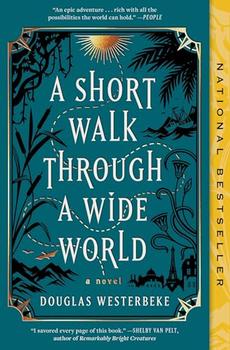Summary | Excerpt | Reading Guide | Reviews | Beyond the Book | Readalikes | Genres & Themes | Author Bio

A Novel
by Douglas Westerbeke
And then the pain strikes—a terrible, venomous pain—a weeping pain, like an ice pick through a rotten tooth. It drives straight down her spine, from the base of her skull to the small of her back. She shudders as if electrified, then stiffens up, crushing all the slack out of her body. The old man stops his chattering, watches her face turn cold and pale, watches her lips form soundless words. He's afraid she might topple over in front of him. But she doesn't topple. She doesn't even cry out. She clenches her jaw, her body, and shuffles toward the next stall, a jagged limp in her step.
"A boat!" she calls out to anyone. Many turn to hear. None understand. "A boat, a boat, a boat…" She chants the words as she limps past vendors and their stands, as if tossing lifelines from a sinking ship to those onshore. Another stab of pain and the first sparks of panic fly through her brain.
She approaches a woman by a firepit, stirring a yellow curry in an iron wok. She opens her book to the page newly decorated with a drop of blood. Not easy, with all her muscles twitching.
The pages are full of little drawings, hundreds of them, a collection of useful things—bananas, beds, parasols, horses and carriages, needles and thread, locomotives, clockfaces, and candlesticks. She flips through pages with rattled hands until, finally, she finds the little pencil sketch of a boat, of several different kinds of boats—sailboats, steamboats, luxury liners, and canoes, so there can be no mistake.
"A boat? Bateau?"
No response from the woman. Do they know Cantonese here? China is not so far. She'd been in China only a month ago, or so it seemed, cutting through the jungle with a worn-down machete. Now she's here, south, begging for her life on a riverbank.
"Syún?"
Still the woman doesn't respond, only stares. Does she know the local word? She'd picked up a few. She'd thought that much ahead. Touk? Was that it?
"Touk?"
But instead of answering her, instead of engaging in some kind of pantomimed conversation as people usually do, the woman drops her big wooden spoon into the curry and silently backs away.
And now she knows she must look very bad. She looks at the handkerchief in her hand. It's entirely red. The noises of the market have, bit by bit, gone mute, as if she's underwater, which could only mean that she's bleeding from the ears, too, and, of course, her mouth is full of blood. She can taste it. She licks her teeth and it pools over her lips and then, to her shame, she knows it's been dripping down her chin the whole time. She must be a terror to behold.
The pain advances; her entire head is an exposed nerve, a jagged blade scraping the inside of her skull. A terrible pressure builds up against her eyeballs and the ice pick that skewers down the small of her back drives straight into her left leg. She stifles a scream. When she walks, her leg drags behind her like a dead animal.
She wipes her face with her sleeve. It only smears blood across her cheeks. She scans the market for fishermen, ferrymen, anyone who might take her away. She holds out the picture of the boat for all to see.
"Boat! Bateau! Syún! "
No one comes to her aid, but they do stare, fascinated and afraid. She looks rabid, crazed. She looks like someone who can't be saved. Why would a diseased woman want a boat? To die in? A floating coffin in which to lay her dead body? Would they ever get their boat back? And she can't explain because this is one language too many. She's learned plenty by now—Arabic, Spanish, Mandarin, and Cantonese, even more, even a little Circassian, for God's sake—but she can't learn them all.
Then she hears—yes, it is—English behind her, somewhere in the crowd, a small clear voice.
"Mama, that lady needs help!"
She turns and sees the child, a little golden-haired girl above the crowd, above a sea of black hair and conical hats, as if suspended there in her white sunny blouse and pinafore dress—but no, actually sitting on someone's shoulders, near enough to see, but too far to help. British? American? They will understand her. She holds out her red-stained hand, as if to wave, but in another moment the girl is swallowed up in the marketplace.
Excerpted from A Short Walk Through a Wide World by Douglas Westerbeke. Copyright © 2024 by Douglas Westerbeke. Excerpted by permission of Avid Reader Press. All rights reserved. No part of this excerpt may be reproduced or reprinted without permission in writing from the publisher.
Your guide toexceptional books
BookBrowse seeks out and recommends the best in contemporary fiction and nonfiction—books that not only engage and entertain but also deepen our understanding of ourselves and the world around us.